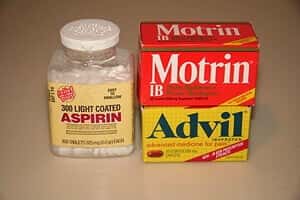
Cancer remains one of our most challenging health concerns. Despite new immunotherapies, far too many people die each year of malignancies. And colorectal cancer remains a top killer. According to the CDC, it is the fourth leading cause of cancer-related death in the US. That’s why prevention is so important. Could something as seemingly simple as an aspirin help prevent colorectal cancer?
The Pros and Cons of Aspirin vs. Colorectal Cancer:
One reader asks an intriguing question:
Q. My father had colon cancer, and I have had polyps myself, including a precancerous one. Consequently, I might be an ideal candidate for daily aspirin to prevent colon cancer. However, my family also has a huge history of stroke.
In a previous column, you addressed aspirin therapy as a rather significant risk factor for stroke. I don’t know how to weigh the risk/benefit ratio of aspirin therapy, considering these two factors. Can you help?
How Aspirin Can Help Against Colorectal Cancer:
NSAIDs and Colon Polyps:
Investigators writing in the BMJ (Dec. 5, 2016) report that a nonsteroidal anti-inflammatory drug (NSAID) like ibuprofen reduces the risk of colorectal cancer.
The authors analyzed data from 15 randomized controlled trials involving over 10,000 patients previously diagnosed with colorectal cancer. The subjects had been diagnosed with neoplastic colon polyps during colonoscopy. In such patients the risk of a recurrence is worrisome.
In the studies included in the analysis, various preventive agents were randomly compared to each other and to placebo. The trials then had people undergo colonoscopy at a later time to see whether they had developed additional cancerous colon polyps.
The Results Please:
Those taking an NSAID were least likely to develop further cancerous adenomatous polyps. Low-dose aspirin came in as the second-best choice, while calcium, vitamin D, folic acid and high-dose aspirin were not as helpful.
Regular NSAID use has risks, however. To learn more about the serious complications of drugs like diclofenac, ibuprofen, meloxicam, naproxen and similar medications, please check out this link. The authors of the new research conclude that low-dose aspirin appears to have “the most favorable safety profile” when it comes to preventing a recurrence of colorectal cancer.
In their own words the authors offer:
“In conclusion, among people with previously resected colorectal neoplasia, non-aspirin NSAIDs are effective for the prevention of advanced metachronous neoplasia over a three to five year period, but the risk:benefit profile potentially favors use only in those with a history of high risk neoplasia. After non-aspirin NSAIDs, low dose aspirin alone has the second highest probability of being most effective for preventing advanced metachronous neoplasia and, with its favorable risk:benefit profile, could be considered as an agent for chemoprevention of secondary colorectal cancer in a select group of patients.”
A gastroenterologist should be consulted about the benefit-risk ratio for any such prevention strategy.
Other Research Supports These Findings:
According to the CDC:
Colorectal cancer is far more common than most people realize. The CDC states the numbers clearly:
“Of cancers that affect both men and women, colorectal cancer is the second leading cause of cancer-related deaths in the United States and the third most common cancer in men and in women.”
The latest statistics show that:
136,119 people in the United States were diagnosed with colorectal cancer, including 71,099 men and 65,020 women.
51,813 people in the United States died from colorectal cancer, including 27,230 men and 24,583 women.
Anything we can do to reduce colorectal cancer has huge public health ramifications.
Rick Factors for Colorectal Cancer Include:
- Eating red meat
- Eating processed meat (lunchmeat, sausage, bacon, bologna, pepperoni, salami, hot dogs, etc)
- Overweight
- Family history of colorectal cancer
- Type 2 diabetes
- Smoking
- Aging (the older we get, the greater the risk)
Taking aspirin or other NSAIDs cannot counteract things like eating processed meats, smoking or being overweight. Nevertheless, there is research reinforcing the findings found at the top of this article. People who have been diagnosed with cancerous polyps or who are at high risk for colorectal cancer should discuss the new research with their gastroenterologist or primary care physician.
Citations
- De Simoni O et al, "IMMUNOREACT 7: Regular aspirin use is associated with immune surveillance activation in colorectal cancer." Cancer, April 22, 2024. DOI: 10.1002/cncr.35297
- Bosetti C et al, "Aspirin and the risk of colorectal and other digestive tract cancers: an updated meta-analysis through 2019." Annals of Oncology, April 1, 2020. DOI: 10.1016/j.annonc.2020.02.012
- Dulai PS et al, "Chemoprevention of colorectal cancer in individuals with previous colorectal neoplasia: systematic review and network meta-analysis." BMJ, Dec. 5, 2016. doi: https://doi.org/10.1136/bmj.i6188

